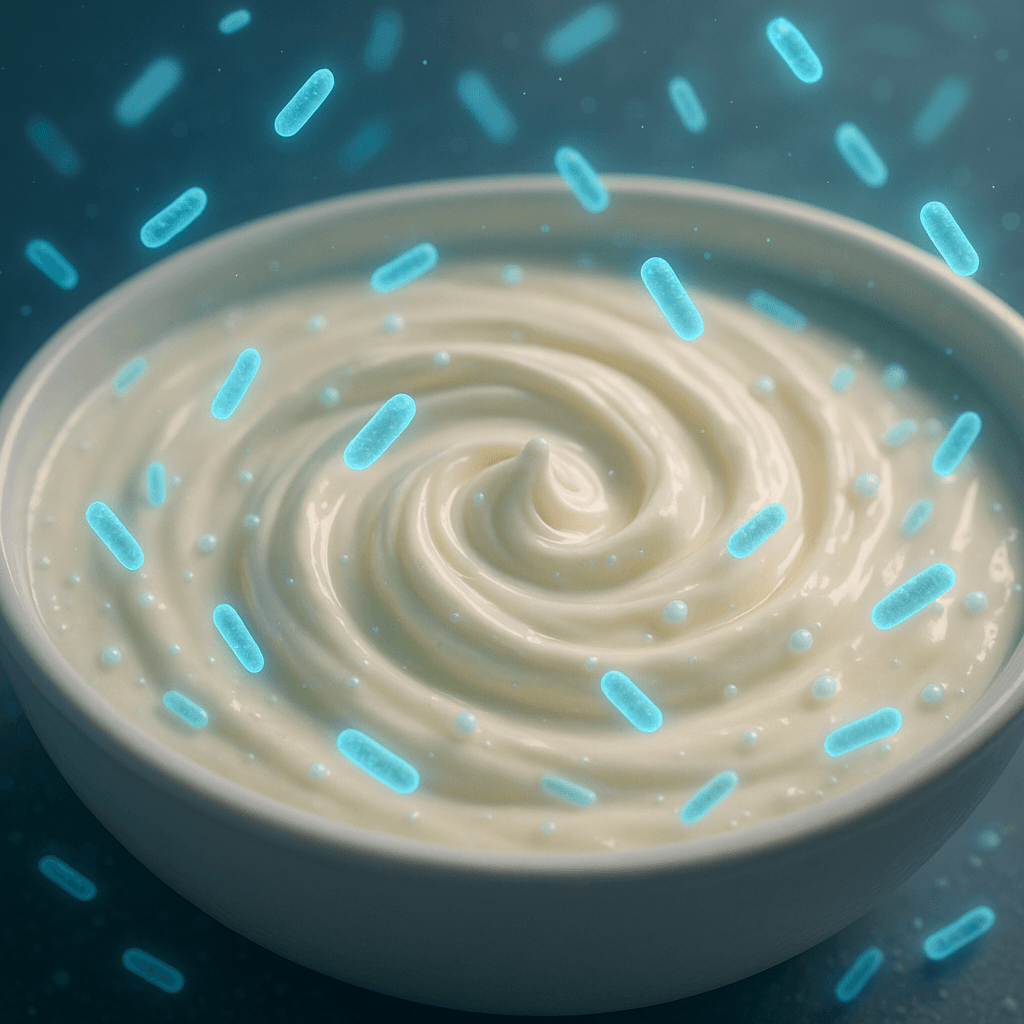Over the past few years cardiologist Dr. William Davis has sparked intense interest in a unique homemade yogurt made with the probiotic bacterium Limosilactobacillus Reuteri. Unlike typical store‑bought yogurt, his version uses specific strains (ATCC PTA 6475 and DSM 17938) and a long fermentation to yield extremely high counts of L. Reuteri organisms. Dr. Davis claims that consuming this yogurt boosts oxytocin levels, improves skin and hair, relieves pain, modulates mood and even supports weight control.
This post summarizes the story behind his probiotic yogurt, explains how it differs from conventional yogurt and reviews the scientific evidence for its benefits and potential benefits. No instructions on how to make the yogurt are given here; this article focuses on the history and science.
Dr. William Davis and the origins of L. Reuteri yogurt
Dr. Davis is best known for his book Wheat Belly and his advocacy of a grain‑free, low‑carb lifestyle. In the mid‑2010s he became interested in L. Reuteri after reading MIT studies showing that supplementing mice with this bacterium increased oxytocin production and dramatically improved wound healing and fur quality dspace.mit.edu. When he investigated commercially available yogurts, he found that they typically contained only L. bulgaricus, Streptococcus thermophilus and related strains, with much lower bacterial counts than those used in the laboratory studies. He approached large yogurt manufacturers to see if they would incorporate L. Reuteri into their products, but was told that the bacterium “cannot be used to ferment yogurt”. Determined to help his patients access high‑dose L. Reuteri, Dr. Davis devised a home fermentation protocol using BioGaia Gastrus tablets as a starter and incubating the mixture at human body temperature for 36 hours. He documented the process in his blog and observed that many people reported improvements in skin health, hair thickness and overall wellbeing after consuming his yogurt.
Why this yogurt differs from regular yogurt
The yogurt Dr. Davis recommends diverges from typical yogurt in several important ways:
- Bacterial strains: conventional yogurts usually contain L. delbrueckii subsp. bulgaricus and Streptococcus thermophilus, sometimes with added Bifidobacteria. Dr. Davis’s yogurt uses L. Reuteri ATCC PTA 6475 and DSM 17938, strains normally found in small numbers in humans but rarely present in commercial dairy.
- Fermentation time & temperature: regular yogurts ferment at 42–46 °C (107–115 °F) for 4–8 hours; L. Reuteri requires a lower temperature (~37–38 °C) and a longer incubation (about 36 hours) to multiply vigorously. The prolonged fermentation allows the bacteria to double roughly every three hours, yielding hundreds of billions of colony‑forming units (CFU) per serving.
- Bacterial count: a half‑cup serving of Dr. Davis’s yogurt is estimated to contain about 262 billion CFU of L. Reuteri, whereas most commercial yogurts provide only 1–10 million CFU per cup. Probiotic supplements typically offer 1–50 billion CFU, highlighting how the yogurt achieves much higher doses.
- Therapeutic dose & taste: Dr. Davis suggests a half‑cup per day as a therapeutic amount, whereas commercial yogurt is consumed mainly for taste and digestive support. The long fermentation gives the yogurt a mild, creamy flavour rather than the tartness of typical yogurt.
Table 1 – comparison of L. Reuteri yogurt to common fermented products
| Product | Main strains & fermentation | Typical CFU per serving | Notes |
| Dr. Davis’s L. Reuteri yogurt | L. Reuteri ATCC PTA 6475 & DSM 17938 fermented ~36 h at ~37 °C | ~262 billion CFU/½ cup | Focus on oxytocin and anti‑inflammatory effects; uses long fermentation |
| Commercial yogurt | L. bulgaricus, S. thermophilus (4–8 h at ~42 °C) | 1–10 million CFU/cup | Provides basic probiotics and calcium; not optimized for L. Reuteri |
| Probiotic capsules | Varies (e.g., Lactobacillus, Bifidobacterium) | 1–50 billion CFU per 1–2 capsules | Convenient; strains differ from Dr. Davis’s yogurt |
| Kefir | Multiple yeasts & bacteria | 10–30 billion CFU/cup | Contains diverse microbes but little L. Reuteri |
Scientific mechanisms behind L. Reuteri’s effects
L. Reuteri is not just another “friendly” bacterium. Research in animals and humans suggests several mechanisms that could underlie its reported benefits:
- Oxytocin regulation: studies in mice show that feeding L. Reuteri increases release of the hormone oxytocin from the hypothalamus, improving wound healing and social behaviours pubmed.ncbi.nlm.nih.gov. When L. Reuteri is absent, oxytocin levels decline and mice exhibit slower tissue repair dspace.mit.edu. The ATCC PTA 6475 strain appears particularly potent at stimulating oxytocin.
- Anti‑inflammatory actions: L. Reuteri produces compounds (Reuterin, histamine) that inhibit inflammatory cytokines like TNF‑α and IL‑6 while increasing anti‑inflammatory IL‑10. This immunomodulation may explain improvements in skin conditions and pain.
- T‑regulatory cell induction: the bacterium promotes regulatory T cells, which help calm immune responses and facilitate tissue repair pubmed.ncbi.nlm.nih.gov.
- Upper gastrointestinal colonisation: unlike many probiotics that pass through transiently, L. Reuteri colonises the stomach, duodenum and proximal small intestine. Its production of bacteriocins (antimicrobial peptides) can inhibit opportunistic microbes such as Candida and E. coli, potentially reducing the risk of small intestinal bacterial/fungal overgrowth (SIBO/SIFO).
- Gut–brain axis modulation: by altering gut flora and producing neuroactive metabolites, L. Reuteri influences the vagus nerve and serotonin signalling, which may affect mood and cognition. In a 2025 study, L. Reuteri DSM 17938 reduced anxiety‑ and depression‑like behaviours in mice exposed to inflammatory stress pmc.ncbi.nlm.nih.gov.
- Metabolic effects: the bacterium appears to improve insulin sensitivity and reduce fat accumulation. Animal experiments show that mice fed L. Reuteri remain leaner and more resistant to diet‑induced obesity dspace.mit.edu.
Evidence of benefits and potential benefits
Skin health and wound healing
- Improved collagen and wound repair: Mice supplemented with L. Reuteri heal skin wounds significantly faster than controls, an effect dependent on increased oxytocin pubmed.ncbi.nlm.nih.gov. Human volunteers also showed accelerated wound closure when consuming L. Reuteri dspace.mit.edu.
- Psoriasis relief: anecdotal reports and blog posts describe reductions in psoriasis severity after six weeks of daily L. Reuteri yogurt consumption; patients note softer skin and decreased itching.
- Anti‑aging effects: the ATCC PTA 6475 strain triggers oxytocin release that promotes collagen synthesis and thicker skin, which might explain reports of reduced wrinkles and improved hair thickness.
Fibromyalgia, chronic pain and joint health
- Pain reduction: Individuals with fibromyalgia who tried Dr. Davis’s yogurt reported fewer aches, better joint flexibility and a sense of rejuvenation. These effects may stem from the anti‑inflammatory properties of L. Reuteri and its ability to modulate the gut‑brain axis.
- Bone density: animal studies show that L. Reuteri supplementation increases bone mass and density in male mice, possibly via suppression of osteoclast activity dspace.mit.edu. Human data are preliminary but suggest potential benefits for osteoporosis.
Mental health and mood
- Anxiety and depression: In the 2025 mouse study mentioned above, L. Reuteri DSM 17938 improved behaviours associated with anxiety and depression by reshaping the gut microbiota and modulating metabolite pathways pmc.ncbi.nlm.nih.gov. People consuming the yogurt often report better sleep and reduced stress.
- Social bonding and empathy: Elevated oxytocin levels can enhance social recognition, trust and empathy. Anecdotal accounts in Dr. Davis’s community mention feeling more connected to others. While direct human studies on L. Reuteri–induced social bonding are sparse, the mechanistic link via oxytocin is plausible pubmed.ncbi.nlm.nih.gov.
Metabolic health and weight management
- Modest weight loss: Some self‑reported experiences indicate that regular consumption of L. Reuteri yogurt leads to gradual weight loss or easier weight maintenance. Animal studies also show resistance to obesity dspace.mit.edu.
- Improved glucose control: L. Reuteri may enhance insulin sensitivity and reduce fasting glucose, though controlled human trials are limited. People with type 2 diabetes who incorporated the yogurt into a low‑carb diet sometimes report lower HbA1c values.
Gut health and immune defence
- Colonisation and infection control: because L. Reuteri inhabits the upper gut and produces bacteriocins, it may protect against overgrowth of pathogenic bacteria and yeast. This could lower the risk of SIBO/SIFO, diarrhoea and gastric infections.
- Reduced infant colic and IBS symptoms: the DSM 17938 strain is well studied in infants and adults; clinical trials show reduced crying time in colicky infants and relief from irritable bowel syndrome symptoms.
Other potential benefits
- Cardiovascular health: another L. Reuteri strain, NCIMB 30242 (not used in Dr. Davis’s yogurt), has been shown to lower LDL cholesterol and increase vitamin D levels.
- Immune modulation: by increasing regulatory T cells, L. Reuteri may help prevent autoimmune responses and allergies pubmed.ncbi.nlm.nih.gov.
- Longevity: mice consuming L. Reuteri live longer, maintain healthier fur and remain more active as they age dspace.mit.edu. Whether these effects translate to humans remains unknown but is intriguing to proponents.
Strain‑specific benefits
Different strains of L. Reuteri exhibit distinct properties:
- ATCC PTA 6475: stimulates oxytocin release, accelerates wound healing and is linked to skin and hair improvements. Many of Dr. Davis’s reported benefits (e.g., reduced wrinkles, thick hair) are attributed to this strain.
- DSM 17938: derived from the same ancestor as 6475 but adapted for safety in infants. It has been shown to relieve infant colic and diarrhoea and to modulate the gut microbiota in adults pmc.ncbi.nlm.nih.gov.
- NCIMB 30242: used in some supplements, this strain lowers LDL cholesterol and may raise vitamin D. It is not part of Dr. Davis’s yogurt but illustrates the strain‑dependent nature of benefits.
- DSM 20016: a strain with limited research but used in certain commercial probiotics.
Balancing hype with evidence
Although Dr. Davis’s L. Reuteri yogurt has garnered enthusiastic testimonials and plausible scientific mechanisms, several caveats are essential:
- Most evidence is preliminary: many of the dramatic effects have been observed in mice or are anecdotal reports from self‑selected individuals. Randomised controlled trials in humans are scarce.
- Strain and dose matter: benefits observed with ATCC PTA 6475 may not occur with other strains. The high bacterial count achieved by long fermentation is crucial; eating standard yogurt or low‑dose supplements will not deliver the same CFU.
- Not a cure‑all: while some people experience remarkable improvements, others notice little change. Chronic conditions often require comprehensive lifestyle changes (diet, exercise, stress management) beyond a single probiotic.
- Safety considerations: L. Reuteri is generally considered safe, but immunocompromised individuals or those with severe illnesses should consult healthcare professionals before consuming large quantities of probiotic foods.
Conclusion
Dr. William Davis’s L. Reuteri yogurt project combines curiosity, do‑it‑yourself fermentation and emerging science. Motivated by research showing that L. Reuteri enhances oxytocin release and wound healing, he created a high‑potency yogurt that differs from commercial products in strain composition, fermentation time and microbial count. Evidence suggests potential benefits for skin health, pain reduction, mental wellbeing, metabolism and immune function. Yet much of the data comes from animal studies or personal stories, and human trials are needed to validate these claims. For health enthusiasts willing to experiment, Dr. Davis’s yogurt offers an intriguing probiotic food with unique properties, but it should be viewed as one tool among many in a holistic approach to health. Always seek medical advice when making significant changes to your diet or health regimen.
More scientific sources
- Poutahidis T, Springer A, Levkovich T, Qi P, Varian BJ, Lakritz JR, et al. Microbial symbionts accelerate wound healing via the neuropeptide hormone oxytocin. PLoS One. 2013;8(10):e78898. https://doi.org/10.1186/s13099-025-00739-8
- Mo X, Guo S, He D, Cheng Q, Yang Y, Wang H, et al. Lactobacillus reuteri DSM 17938 ameliorates LPS-induced depression-like and anxiety-like behaviors by modulating gut microbiota and brain metabolic function. Gut Pathogens. 2025;17(1):8. https://doi.org/10.1186/s13099-025-00739-8
- Poutahidis T, Kearney SM, Levkovich T, Qi P, Varian BJ, Lakritz JR, et al. Probiotic “glow of health”: it’s more than skin deep. Beneficial Microbes. 2014;5(2):109-119. https://doi.org/10.1371/journal.pone.0084877
- Poutahidis T, Springer A, Levkovich T, Qi P, Varian BJ, Lakritz JR, et al. Probiotic microbes sustain youthful serum testosterone levels and testicular size in aging mice. PLoS One. 2014;9(1):e84877. https://doi.org/10.1371/journal.pone.0084877
- Nilsson AG, Sundh D, Bäckhed F. One-year supplementation with Lactobacillus reuteri ATCC PTA 6475 counteracts a degradation of gut microbiota in older women with low bone mineral density. Osteoporos Int. 2022;33(9):1997-2009. https://ouci.dntb.gov.ua/en/works/7qykNJw7/
- Jones ML, Martoni CJ, Parent M, Prakash S. Cholesterol lowering and inhibition of sterol absorption by Lactobacillus reuteri NCIMB 30242: a randomized controlled trial. Eur J Clin Nutr. 2012;66(11):1234-1241. https://doi.org/10.1038/ejcn.2012.126
- Jones ML, Martoni CJ, Ganopolsky JG, Labbe A, Prakash S. Oral supplementation with probiotic Lactobacillus reuteri NCIMB 30242 increases mean circulating 25-hydroxyvitamin D: a post-hoc analysis of a randomized controlled trial. J Clin Endocrinol Metab. 2013;98(7):2944-2951. https://doi.org/10.1210/jc.2012-4262
- Peterson DA, Frank DN, Pace NR, Gordon JI. Microbial reprogramming inhibits Western diet-associated obesity. PLoS One. 2015;10(2):e0118146. https://doi.org/10.1371/journal.pone.0118146
- Britton RA, Versalovic J. Probiotic Lactobacillus reuteri biofilms produce produce antimicrobial and anti-inflammatory factors. Gastroenterology. 2008;134(2):536-548. https://www.researchgate.net/publication/24001939_Probiotic_Lactobacillus_reuteri_biofilms_produce_antimicrobial_and_anti-inflammatory_factors
- Varian BJ, Poutahidis T, Levkovich T, Ibrahim YM, Lakritz JR, Erdman SE. Microbial lysate upregulates host oxytocin and social behavior via vagus-mediated pathways. Sci Rep. 2017;7:8742. https://doi.org/10.1038/s41598-017-08692-6
If you require additional information about how to produce an enhanced version of Dr Davis’s yogurt, feel free to explore our article about Optimizing Dr Davis’s L. Reuteri Yogurt: The Two-Jar Protocol.
If you wish to learn more about the Brain-Gut Axis, feel free to explore our article about The connection between the brain and the gut.


